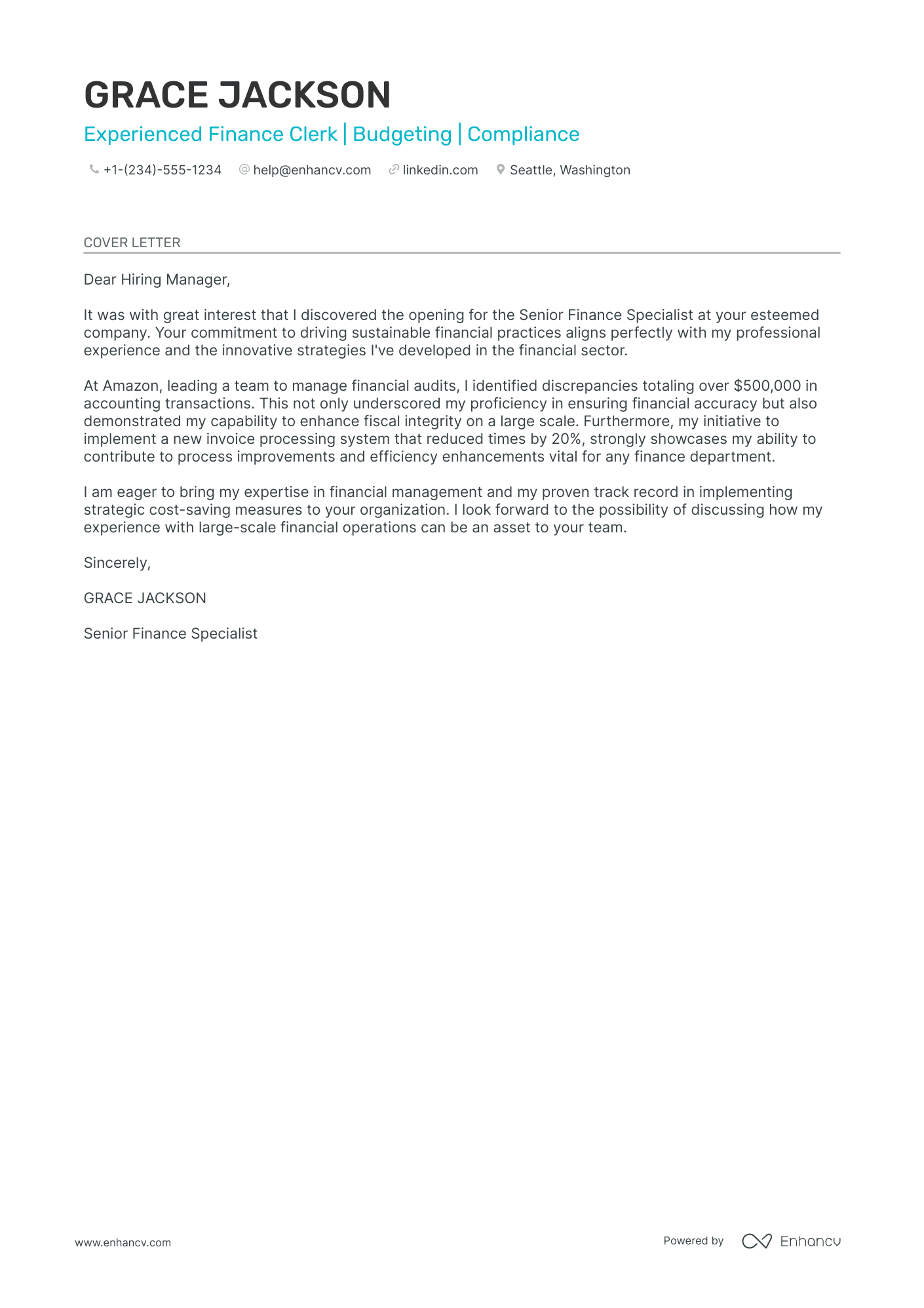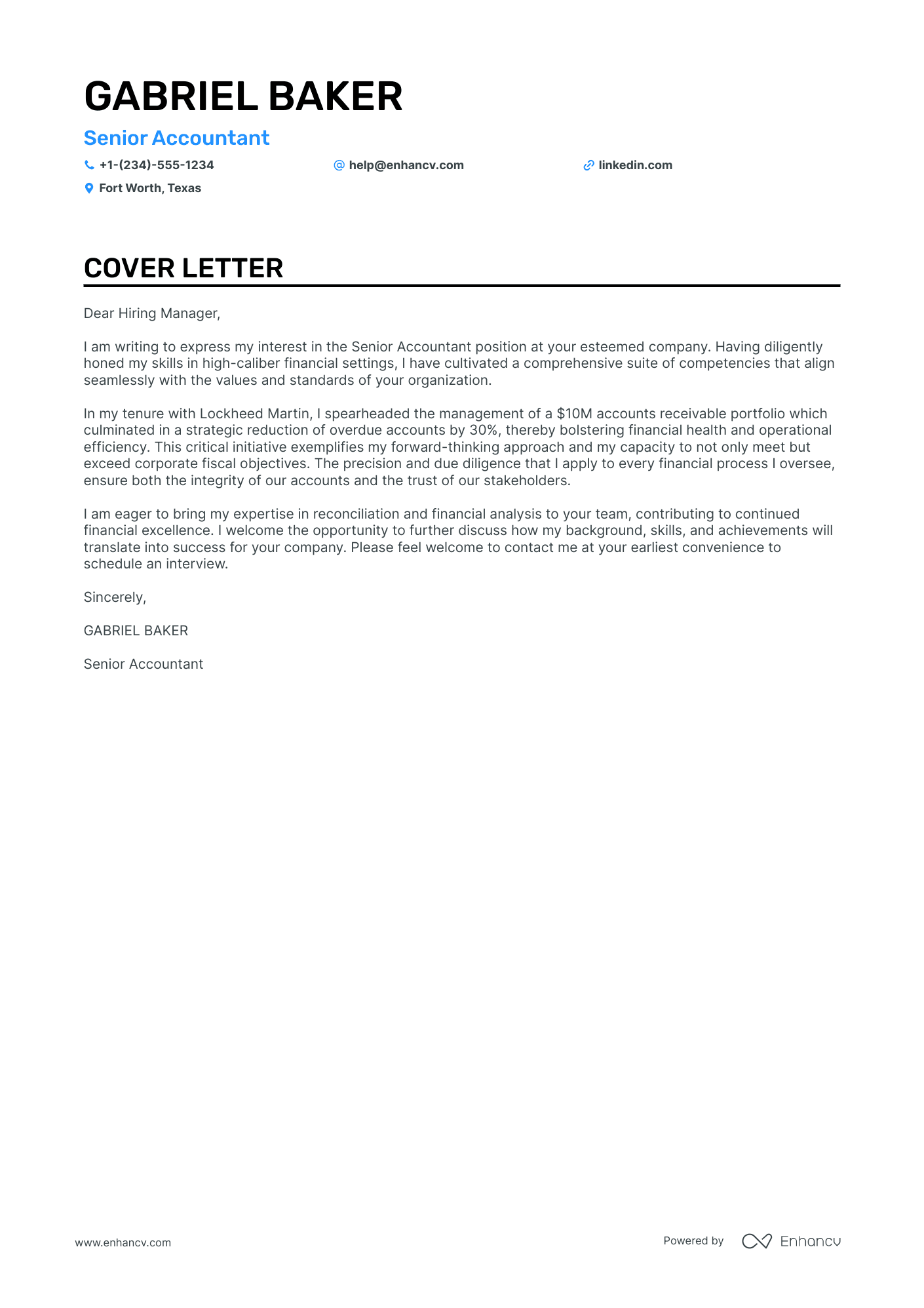Crafting a finance cover letter can be daunting. You've been steadily applying for jobs, and suddenly, you're asked to submit more than a resume. Panic seeps in—how do you avoid mere repetition, eloquently showcased on your CV? Your cover letter is your spotlight, an opportunity to narrate your proudest professional feat without resorting to overused phrases. Remember, while formality is key, brevity is your friend; keep it to one compelling page that tells your unique story.
- Introduce your profile to catch recruiters' attention;
- Use professional templates and examples to make sure your finance cover letter follows the best industry standards;
- Settle on your most story-worthy achievement to shine a light on what makes your application unique;
- Write a finance cover letter, even when you lack professional experience.
Ready to start with the basics: upload your resume to Enhancv's AI, below, to see the finance cover letter it would write for you.
If the finance isn't exactly the one you're looking for we have a plethora of cover letter examples for jobs like this one:
Drop your resume here or choose a file.
PDF & DOCX only. Max 2MB file size.
Finance cover letter example
Sebastian Martin
Charlotte, North Carolina
+1-(234)-555-1234
help@enhancv.com
- Emphasize Relevant Achievements: Highlighting a significant reduction in error rates and improvement in efficiency from past roles as Sebastian did with his financial reporting system accomplishments indicates measurable successes that are compelling to hiring managers.
- Quantify Impact: Sebastian provided specific percentages to quantify his impact on revenue growth and reporting efficiency. Using hard numbers can make a stronger case for a candidate's previous effectiveness and potential contribution.
- Match Skills with Job Requirements: Stating his experience with financial modelling and data-driven decision-making aligns well with the demands of a finance analyst role, which typically requires strong analytical skills and the ability to interpret financial data to make business recommendations.
Designing your finance cover letter: what is the best format
Let's start with the basics, your finance cover letter should include your:
- Header
- Greeting
- Introduction
- Body paragraph
- Closing statement
- Signature (that's not a must)
Next, we'll move to the spacing of your finance cover letter, and yes, it should be single-spaced (automatically formatted for you in our cover letter templates).
Don't go for a old-school font (e.g. Arial or Times New Roman), but instead, pick an ATS-favorite like Chivo, Volkhov, or Raleway, to stand out.
Our cover letter builder is also set up for you with the standard one-inch margin, all around the text.
Finally, ensure your finance resume and cover letter are in the same font and are submitted in PDF (to keep the formatting in place).
P.S. The Applicant Tracker System (or ATS) won't be assessing your [job] cover letter, it's solely for the recruiters' eyes.
Writing cover letters just got easier. Use our free cover letter generator to create yours instantly.
The top sections on a finance cover letter
- Header with Contact Information: Include your name, address, phone number, email address, and LinkedIn profile to make it easy for the recruiter to contact you; finance professionals must demonstrate attention to detail from the outset.
- Opening Greeting: Use a professional salutation and, if possible, address the hiring manager by name to show your dedication to personalizing your application, indicative of the interpersonal skills required in finance.
- Career Summary and Intent: Begin with a concise overview of your finance experience, specifically highlighting any roles or achievements that align with the job you're applying for, demonstrating upfront the value you can bring to the team.
- Body - Relevant Experience and Skills: Elaborate on your previous finance roles, quantifiable accomplishments, and the specific skills you've gained that are directly relevant to the position, showcasing your ability to impact the company's financial health.
- Closing and Call to Action: End your cover letter by reiterating your interest in the role, thanking the reader for their time, and suggesting an interview or further discussion to convey your proactive attitude, which is critical in the finance industry.
Key qualities recruiters search for in a candidate’s cover letter
Strong quantitative and analytical skills: Essential for tasks like financial modeling, forecasting, and evaluating financial statements.
Attention to detail: Critical to accurately manage financial data and avoid costly mistakes in reports and analyses.
Knowledge of financial regulations and standards: Important to ensure compliance with laws like Sarbanes-Oxley, GAAP, and others relevant to the finance industry.
Advanced proficiency in financial software: Recruiters look for experience with tools like Microsoft Excel, financial modeling programs, and ERP systems such as SAP or Oracle.
Experience in budgeting and forecasting: Demonstrates the ability to plan and manage financial resources effectively over time.
Effective communication skills: Necessary for presenting financial data to stakeholders and collaborating with team members across departments.
How to greet recruiters in your finance cover letter salutation
As the saying goes, "You never get a second chance to make a first impression."
Write your finance cover letter salutation to be more personalized to the actual hiring manager, who is set to assess your profile by:
- greeting them on a first-name basis, if you have previously communicated with them (e.g. "Dear Sam,");
- using their last name, if you have more formal communication or haven't spoken to them (e.g. "Dear Mr. Harrows" or "Dear Ms. Marshall");
- writing "Dear HR Team" or "Dear Hiring Manager", if you have no clue about who's recruiting for the role.
Search on LinkedIn, Google, or the company website to find information as to the recruiter's name.
In any case, avoid the impersonal "Dear Sir or Madam".
List of salutations you can use
- Dear Hiring Manager,
- Dear [Name of the Hiring Manager],
- Dear [Name of the Team or Department] Team,
- Dear [Company Name] Recruiter,
- Dear [Mr./Ms. Last Name],
- Dear [Full Name],
Get creative with your finance cover letter introduction
Recruiters are going to assess plenty of candidate profiles for the role. Thus, anything you do to stand out will win you brownie points.
Use your finance cover letter introduction to share something memorable about your experience.
But before you go down the rabbit hole of creativity and humor, align your message with the company culture.
For example, if you are applying for a role in some startup, use those first two sentences to tell a funny story (about your experience) to quickly connect with the recruiter.
The middle or body of your finance cover letter body: a great instrument to tell a story
Now that you've set the right tone with the greeting and introduction of your finance cover letter, it's time to get down to business.
Hear us out, the body of your finance cover letter is the best storytelling instrument you have, in your job-hunting arsenal.
Writing the next three to six paragraphs, take the time to reassess the advert to discover job-crucial requirements.
Next, choose one accomplishment that covers those key skills and talents.
Use precisely that achievement to tell an exciting story of how you match the ideal candidate profile.
In the undertones of your story or finance cover letter body, hint at the difference you'd make and sell your application as the perfect one for the job.
Ending your finance cover letter: a closing paragraph with a promise
If you're thinking of finishing your finance cover letter with a "Sincerely yours" or "Thanks for the consideration," you need to read on.
End the final paragraph of your finance cover letter with a twist:
- a promise - of how you'd grow as a professional, part of the company, or improve organizational metrics;
- a call to action - prompt interviewers with some follow-up actions if they are interested in your profile.
A personalized ending would surely help you to stand out by being a memorable candidate.
Which story should you tell in your finance cover letter when you have zero experience
Candidates, lacking professional experience in the field - this one is for you.
Your finance cover letter is an exercise of integrity, honesty, and, above all, spinning a positive narrative around your strengths.
And what better way to capture recruiters' attention than with your most job-relevant achievement (this could be from your internship or volunteering experience)?
Make sure to back up your success with transferrable skills that are relevant to the job (e.g. how your year, studying abroad, has taught you to be more motivated and handle multicultural environments).
Another safe card you can bet on is your career dream: in the body of your finance cover letter, go into the details of how your ambitions would help make the company you're applying for better.
Key takeaways
We hope this finance cover letter writing guide has shown you how to:
- Format your finance cover letter with the mandatory sections (e.g. header, greeting, intro, body, and closing) and select the right font (P.S. It should be the same as the one you've used for your resume);
- Substitute your lack of professional experience with your most noteworthy achievement, outside of work, or your dreams and passions;
- Ensure recruiters have a more personalized experience by tailoring your cover letter not just to the role, but to them (e.g. writing their first/last name in the salutation, etc.);
- Introducing your biggest achievement and the skills it has taught you in your finance cover letter body;
- Write no more than two sentences in your finance cover letter introduction to set the right tone from the get-go.
Finance cover letter examples
By Experience
Finance Intern
By Role








